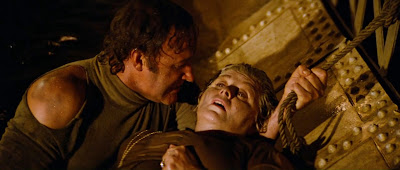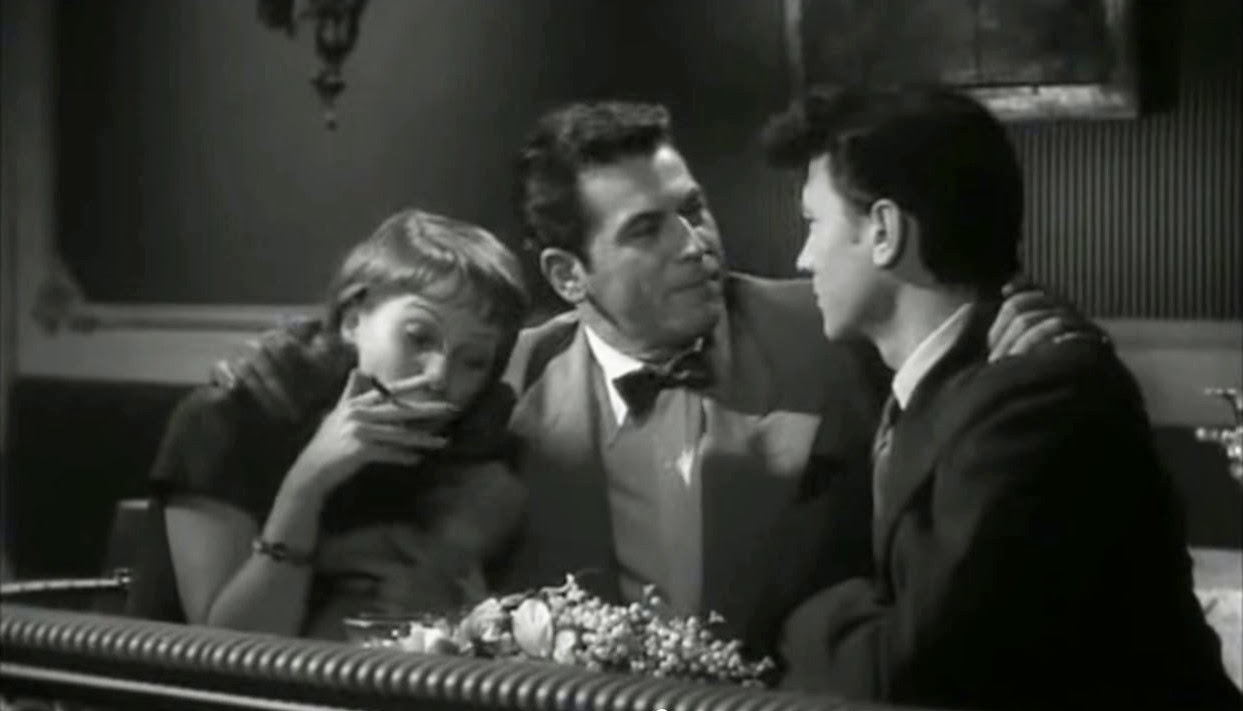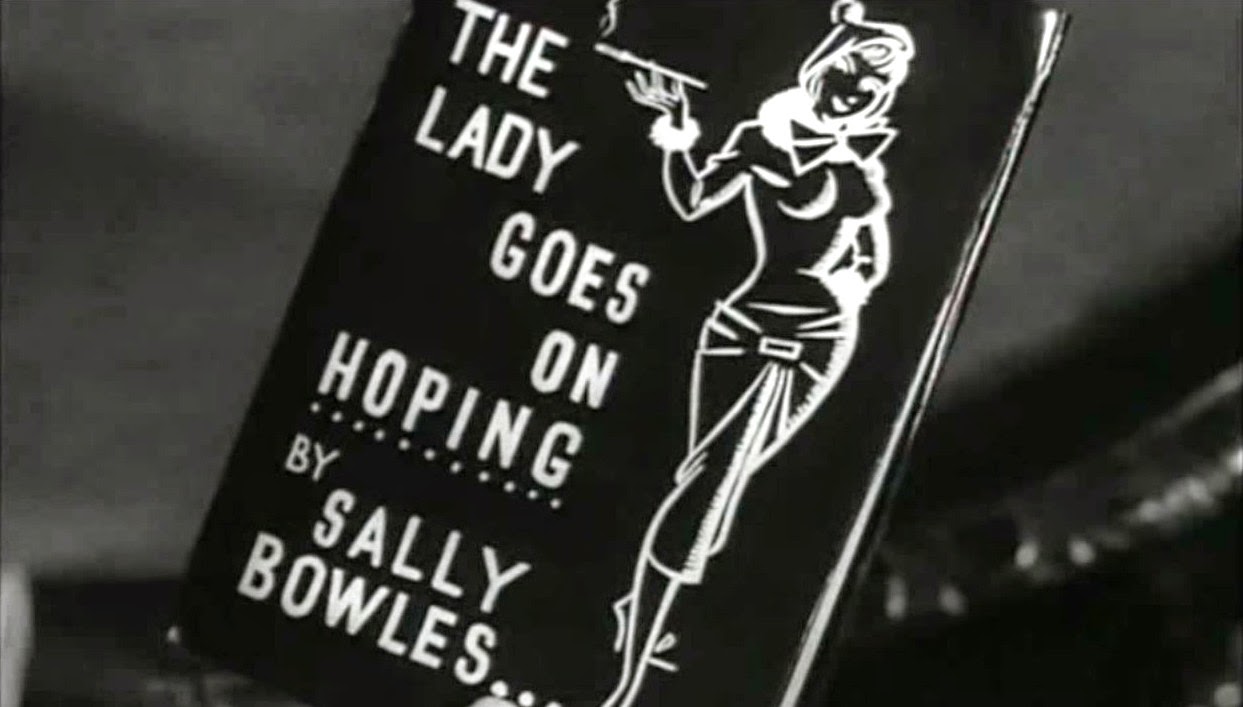Warning: Spoilers galore
My favorite part of our trip was in the evenings. When we were treated to a driving and walking tour of Los Angeles, Hollywood, to be specific. Of all the places we visited, I especially loved seeing Hollywood Boulevard. Hollywood Blvd. was always kind of tacky, but not to my utterly overwhelmed and enthralled eyes. In the early 1970s, it was still a place to go to see first-run movies, where premieres were held, and where they had their annual Christmas parade populated with actual movie stars you've heard of. Hollywood Blvd...all decked out in Christmas decorations, stars on the sidewalks, overflowing with one lit-up movie palace after another…to my eyes, it looked every bit as magical as Main Street in Disneyland.
Who Will Survive--In One Of The Greatest Escape Adventures Ever!
 |
| Gene Hackman as Reverend Frank Scott |
 |
| Ernest Borgnine as Mike Rogo |
 |
| Stella Stevens as Linda Rogo |
All of the 1972 holiday movie releases were playing in the local theaters: Grauman's
Chinese featured Streisand's Up The
Sandbox, Diana Ross was at The Pantages in Lady Sings the Blues, the Cinerama Dome had the Patty Duke thriller
You'll Like My Mother, the Pacific
was showing The Getaway with Steve
McQueen & Ali MacGraw, and Paul Newman was at the Hollywood (currently a Ripley's Believe It or Not museum) in The Life & Times of Judge Roy Bean.
Back then, movie theaters still went all out in the way of marketing gimmicks and displays, so every theater was bathed in colorful
neon, aglow with bright and flashing lights, and everywhere you looked were banners,
streamers, oversized posters, and colossal cardboard promotional cutouts for movies now playing or coming soon. My eyes
were popping out of my head.
As we strolled along Hollywood Boulevard that night, what really stopped me in my tracks was when we came upon the opulent and enormous Egyptian Theater. There, towering at least two stories high above the theater's
massive, winding marquee, was the poster art for a film I'd somehow not heard a single thing
about: The Poseidon Adventure. The
Egyptian, then every bit as glamorous as Grauman's Chinese, was in the middle of an exclusive run of The Poseidon Adventure after hosting
the film's premiere a week prior. The remaining evidence of the event was the massive cast
portraits adorning the sprawling marquee, taller-then-me cutout posters, hanging banners, production stills, posters, and lobby cards filling every inch of available display space. Suddenly I was surrounded by images of what looked like the
most exciting film I'd never heard of.
 |
| Shelley Winters as Belle Rosen |
 |
| Jack Albertson as Manny Rosen |
 |
| Red Buttons as James Martin |
 |
| Carol Lynley as Nonnie Parry |
To understand how a dyed-in-the-wool film fan like
myself managed not to hear a single advance word about a movie that became one of my all-time favorites but the second highest-grossing film of the year, it helps to know what kind
of year for film 1972 was. In both fan magazines and the legitimate press, the
lion's share of 1972 movie coverage/publicity centered around these high-profile
titles: The Godfather (Brando's
comeback!), Cabaret (Judy's daughter makes good!), Last Tango in Paris (Le
Scandale!), Lady Sings the Blues (a Supreme
film debut!), The Getaway (behind-the-scenes
adultery!), and What's Up Doc? (Streisand
meets New Hollywood wunderkind!).
With no nudity, sex, drug use, violent bloodshed, or profanity, The Poseidon Adventure, an old-fashioned throwback to the Grand Hotel-style "all-star cast" melodrama, couldn't really compete with the more daring, youth-oriented releases of the season, so it pitched itself more to the market largely ignored by the New Hollywood: families and the older demographic.
 |
| Roddy McDowall as Acres |
 |
| Pamela Sue Martin as Susan Shelby |
 |
| Eric Shea as Robin Shelby |
 |
| Leslie Nielsen as Captain Harrison |
 |
| Arthur O'Connell as John, the ship's Chaplain |
The
Poseidon Adventure opened on December 15th in Los Angeles and opened a week later back home in San Francisco, where I saw it on Friday the 22nd at the Alexandria Theater. I sat through The Poseidon Adventure twice that weekend and went back to see it two more times over the Christmas holiday. I absolutely loved the film, and it left its mark. For weeks afterward, I couldn't enter a classroom, library, store, or friend's home without imagining what it would look like upside down.
WHAT I LOVE ABOUT THIS MOVIE
It says a lot about the
traditionalism of TV and studio-era films that by the time I was 15, I'd already grown pretty
well-versed in recognizing movie clichés. While I'd not yet seen many of the films
that established the familiar tropes from which so many '70s disaster movies would later draw (The High and the Mighty, Zero Hour!, The Last Voyage), I was familiar enough with combat movies
(dangerous situation + dissimilar people from all walks of life + hero =
everyone discovers what they're really made of); all-star ensemble flicks (the aforementioned Grand Hotel, Tales of Manhattan); and waterlogged melodramas (Lifeboat, A Night to Remember), for The
Poseidon Adventure's high-concept upside-down ocean liner premise to seem intensely original yet reassuringly familiar.
 |
| Reverend Scott, not looking exactly pleased to have someone besides himself talking. Far left is actress Frieda Rentie, sister of 227 actress Marla Gibbs |
On New Year's Eve, the ocean liner S.S. Poseidon (significantly, at least in terms of ironic poignancy, making her final voyage before the scrap heap) is capsized by a tidal wave. While several passengers survive the breathtakingly entertaining catastrophe, only nine of the ship's most stock and photogenic passengers ultimately elect to follow the long-winded Reverend Scott (Hackman) on a perilous climb to safety by navigating their way up to the ship's bottom.
All involved—save for the resourceful reverend, who oozes
so much self-reliance and leadership qualities he can't help but grow tiresome—are spectacularly ill-suited to the task. Still, any life-or-death struggle that begins
with a ragtag group of "types" having to climb a big, tinselly Christmas tree to
salvation is my kind of calamity. And so, armed with little more than pluck, guts, elderly body-shaming, and tight-fitting hot pants, our intrepid troupe begins
their adventure.
Meet The Players / Character Shorthand
In the 1972 shout-fest X, Y and Zee, Elizabeth Taylor has the
line: "I may be the worst thing in the world,
but I carry it in front where you can see it!" Well, if The
Poseidon Adventure could speak, that would be its mantra. It's
old-fashioned, schlocky, and loaded with what director Ronald Neame (The Prime of Miss Jean Brodie) labeled
"cardboardy" characters; but the film carries it all out in front where you can see.
The Poseidon Adventure wears its corniness proudly on its sleeve. And as a 20th Century Fox production, its asserted broad-market, family-friendly appeal feels like a purposeful shift in direction from Fox's rather desperate previous attempts to court the youth market: Myra Breckinridge -1970, The Panic in Needle Park -1971, Beyond the Valley of the Dolls.
Sure, The Poseidon Adventure is hokey, soapy, cliché ridden, and terribly contrived, but (miracles of miracles) it works. And rather magnificently, at that! I loved the premise, enjoyed the archetypal characters, and was thrilled as all get out by the upside-down sets and visual effects. But, most surprising of all was that the filmmakers somehow not only got me to care about these characters, but to respond emotionally to their fates. Who knew a cheesy movie could be so moving?
Sure, The Poseidon Adventure is hokey, soapy, cliché ridden, and terribly contrived, but (miracles of miracles) it works. And rather magnificently, at that! I loved the premise, enjoyed the archetypal characters, and was thrilled as all get out by the upside-down sets and visual effects. But, most surprising of all was that the filmmakers somehow not only got me to care about these characters, but to respond emotionally to their fates. Who knew a cheesy movie could be so moving?
The terrible remake (which Carol Lynley called "The biggest piece of shit I've ever seen")
cost 32 times more and had CGI wizardry up the ass, but I never gave a whit
about what happened to anyone in it, and cannot clearly recall a single scene. The Poseidon Adventure was ripped apart by many critics in its day, but it has aged remarkably well. What seemed corny in 1972 looks rather sweet today. And creators of today's largely disposable and indistinguishable action films could use a lesson on how The Poseidon Adventure takes the time to get us to know/care about the characters before the mayhem starts. The Poseidon Adventure is now 45 years old. Despite its well-earned reputation as a campy favorite, I can't help but think that in the realm of disaster movies, The Poseidon Adventure is some kind of a minor classic of the genre.
PERFORMANCES
One of the peculiarities of the disaster film genre is that
things don't actually improve when "good" actors are cast. Due to the unique demands of a film dominated by fast plotting and special effects, personality tends to win out over performance. Nothing bogs a disaster movie down more than a so-called serious actor trying too hard. For example: for all their innate talent, you'd have to look to an Ed Wood movie to find
performances worse than Olivia de Havilland in The Swarm, or Rock Hudson in Avalanche.
No, with the genre's emphasis on action and expediency, it's often a matter of finding actors with distinct, identifiable, almost over-emphatic screen personas, capable of projecting a level of conviction appropriate to the arch dialogue and bigger-than-life exploits.
Much in the manner that Vincent Price became the master of schlock horror sincerity, disaster film actors who take their roles too seriously come off as ridiculous. Meanwhile, the most compelling performances are often given by those who seem to operate on a level of magic realism that hovers somewhere between authentic and artificial.
The distinction I'm trying to make is that while the cast of The Poseidon Adventure may be quite accomplished actors in their own right, what they're called upon to do in the film doesn't require "good" acting so much as "effective" acting. To make material like this believable, it matters more to strike the right tone; in which case performances ranging from hammy to hoary can prove to be 100% on the money.
THE STUFF OF DREAMS
By no means all, but just a few of my favorite things:
 |
| I don't care how dated the special effects are; the capsizing of The Poseidon is epic moviemaking (Gotta love Red Buttons during this part. That's not acting!) |
 |
| No one on the Poseidon faced a bigger challenge than these two trying to find the beat of the music |
 |
| I love Mrs. Rosen |
 |
| Even in 1972, the Hot Pants Under The Gown Reveal drew gasps and laughs. Loving Linda's reaction |
 |
| That Dive! The biggest shock of the film. It got laughs, applause, and cheers |
 |
| I love Linda Rogo |
The Poseidon Adventure is a favorite. You'll never hear me call it one of the best films ever made; I don't buy into revisionist assessments ranking it a genuine classic (it's great for what it is, but let's not forget what it is); nor do I harbor illusions about its depiction of women (save for Belle and her big moment, the men are all active while the women are reactive) and lack of people of color in the principal cast (Akers & Belle occupy the stereotypical roles of ethnics in action films: "first to die" and "noble sacrifice").
Yet there's no denying The Poseidon Adventure is one of those imperfect films that achieve a lightning-in-a-bottle kind of excellence. From script (dialogue, primarily) to characterizations, to outlandish (albeit exciting) premise; it shouldn't really work as beautifully as it does. But you'd have to look hard and long to find a disaster film that does it better. I've come to regard it with such fondness. I've noticed that over the years, my laughs of derision have turned into laughs of affection. Despite its flaws, I fully understand why it has endured and why so many people have taken it to their hearts.
BONUS MATERIAL
In 1973 MAD magazine once again did a movie satire that hit the nail on the head. In "The Poopsidedown Adventure," the characters are named: Reverend Shout, Hammy & Bellow Roseman, Snoozin & Rotten, Mr. Martyr, Ninny, Mr. Rougho, Limber, and Apers.

























.JPG)




.JPG)
.JPG)
.JPG)




.JPG)


